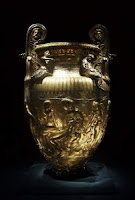 The title of this post comes from the final two lines of Ode on a Grecian Urn, written by John Keats in 1819. I'm not usually a fan of poetry, but I do have a soft spot for Keats. In my humble opinion, he was the greatest of the Romantic poets, and it's a crying shame he didn't receive the attention he deserved during his lifetime.
The title of this post comes from the final two lines of Ode on a Grecian Urn, written by John Keats in 1819. I'm not usually a fan of poetry, but I do have a soft spot for Keats. In my humble opinion, he was the greatest of the Romantic poets, and it's a crying shame he didn't receive the attention he deserved during his lifetime.Since I'm such a fan, I decided to go and see Bright Star, Jane Campion's latest film depicting his romance with Fanny Brawne. Critics are touting it as her best work since The Piano, and I'm deeply saddened to say that this may be so, but it's also by far one of the most boring films I've seen all year - and I forced myself to sit through the travesty that was Dorian Gray.
Scenes are left woefully unfinished as though Campion got so bored of her own work that she simply wandered off to do something else, while the actors seem prone to occasional fits of over-acting. The costumes are gorgeous, but the dialogue lets it all down as it attempts to be pithy but instead comes across as self-indulgent. The film focusses more on Fanny and her talent for dressmaking, which in itself doesn't bother me as it's nice to see a film that re-trains the focus on the muse instead of the genius. What does bother me is how happily the film skips over Keats' actual poetry, only occasionally referring to it, in favour of burning glances between the star-crossed lovers.
As a seemingly headstrong, independent young woman, I desperately wanted to like Fanny. She's at odds with society around her and simply wants to pursue her heart, regardless of convention or practicality. Yet I couldn't like her at all. Yes, she inspired some of the greatest poetry ever written in the English language, but based on this depiction of her...I can't fathom how.









